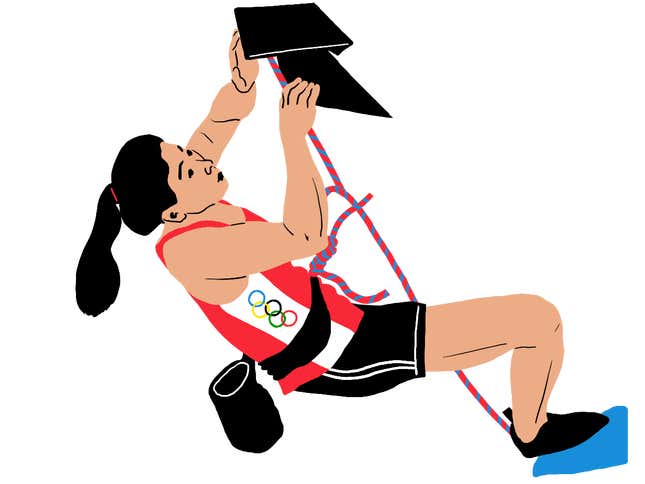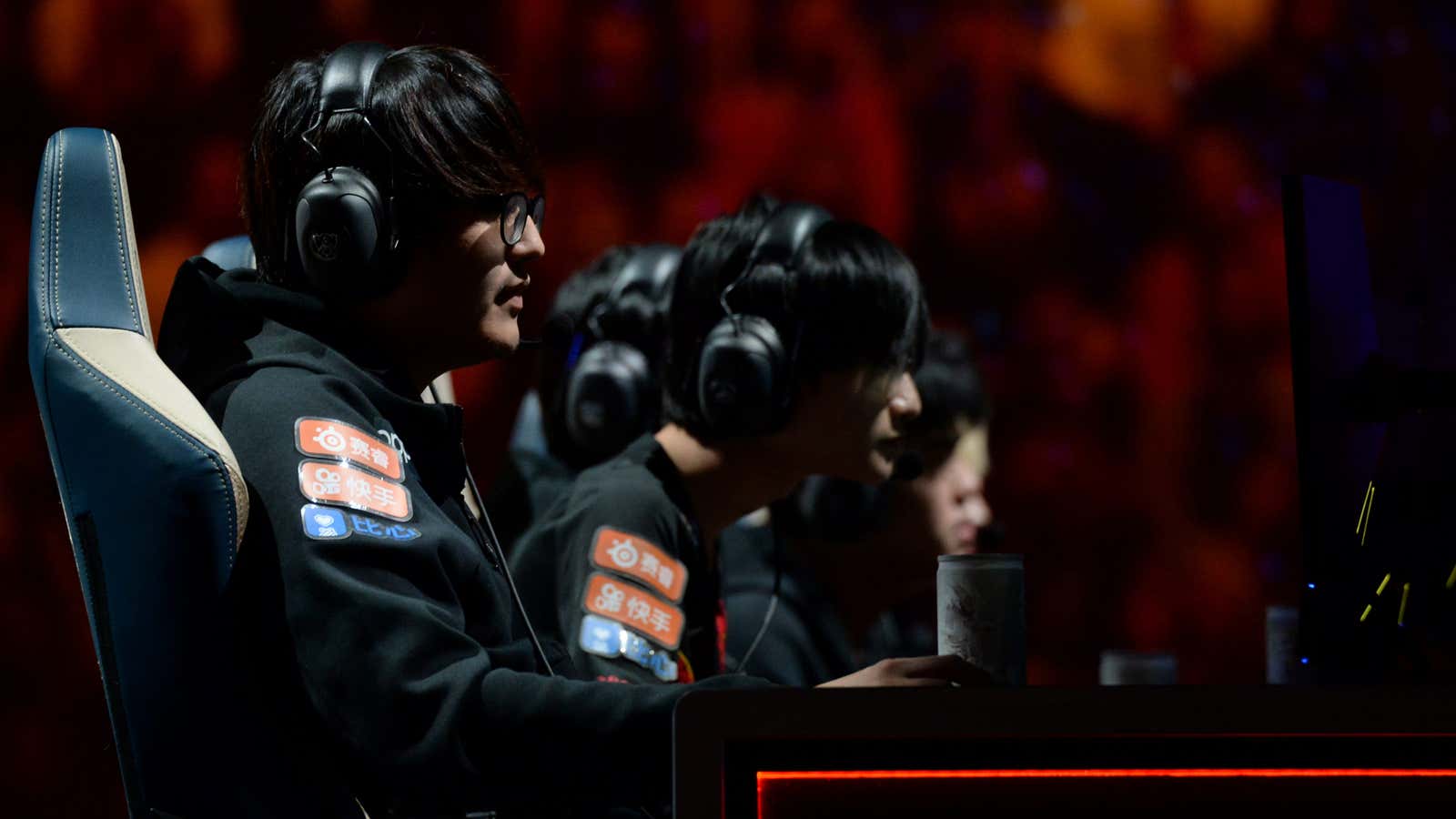Hi Quartz readers!
From demonstrations and political paraphernalia on the podium to an athlete defecting at the Games, there’s been a marked increase in political activity in Tokyo over the past few days—but the Olympics have always been political. Want more global insights in your inbox? Sign up for the Quartz Daily Brief.
Highlight reel
- Canada’s women’s soccer team beat the US in the semifinals.
- Puerto Rico’s Jasmine Camacho-Quinn soared past the women’s 100m hurdles world record holder, the US’ Keni Harrison, to win gold.
- Poland offered asylum to Belarusian sprinter Kristina Timanovskaya after she said she feared for her safety in her home country following remarks critical of her coaches.
- US gymnast Jade Carey took gold in the floor exercise final; her teammate Simone Biles announced she will compete in Tuesday’s balance beam final.
Armchair athletes
In what could be the next big Olympic sport, participants often don’t break a sweat. They don’t even get up from their chairs.
This year, organized competitive video-gaming, also known as esports, will attract nearly 500 million viewers and generate more than $1 billion in revenue. Naturally, the International Olympic Committee has its eye on it.
However, esports have no global governing body, which the IOC requires for approval. And many of the world’s most popular esports games, like League of Legends and Counterstrike, are violent, thus infringing upon the purported Olympic values of friendship and respect. The other roadblock? Esports don’t need the Olympics for legitimacy. They’re already huge (and getting huger) without it.
The IOC lent its support this year to the first-ever “Olympic Virtual Series,” a group of esports events in the run-up to the Tokyo Games. It said it would be “premature” to include esports in the 2024 Games, but left the door open for 2028, when the Games will be hosted in Los Angeles. Casey Wasserman, the head of LA’s Olympic committee, is an esports supporter.
The truth is that neither side needs the other—yet. If esports do join the Olympics in our lifetimes, it will be because of money. The IOC makes a lot of it, but should that ever run dry, it knows where to go to get an influx of cash. —Adam Epstein
By the digits
34.2˚C (93.6˚F): Highest recorded temperature at a Summer Olympics, in Athens in 2004
33: Cities remaining with suitable temperatures to hold the Summer Games by 2085 due to climate change
8: Olympic gold medals Indonesia has ever won, all of them in badminton
$180,111: Winning bid for a recent auction of an 1896 first-place silver medal (the Games didn’t award golds at the time)
~40 hours: Time elapsed between when US Olympic pole vaulter alternate Matt Ludwig—who was at home in Ohio—found out he was eligible for the Games after teammate Sam Kendricks tested positive for Covid-19 and Ludwig’s first qualifying round in Tokyo
7: Golfers in the playoff for the men’s bronze medal on Sunday; it eventually went to Chinese Taipei’s C.T. Pan
What to watch for

Sport climbing makes its Olympic debut on Aug. 3-5. But the format has raised eyebrows among the sport’s burly-forearmed practitioners.
Competitive indoor sport climbing is typically divided into three categories with specialized athletes:
- Lead: Climbers attempt to get as far as possible up a high wall “route” in a given time.
- Bouldering: Unroped climbers complete routes on a short wall.
- Speed: Two roped climbers race to the top of identical routes.
In Tokyo, climbers will have to compete in all three, and then rank on a combined score. Organizers have explained that consolidation was necessary to fit climbing—a sport with an unproven Olympic television audience—in at all. But as one decorated climber told Climbing magazine, it’s “like asking a middle-distance runner to compete in the sprint.” The format may be a one-off: Organizers of the 2024 Paris Games have promised to break it up.
Quotable
“It has never transferred to bars and beam for me. This time it’s literally in every event which sucks. [You] literally cannot tell up from down. It’s the craziest feeling ever, not having an inch of control over your body.” —US gymnast Simone Biles describing the “twisties”
Let’s put a pin in this
With no foreign spectators allowed, the Tokyo Games put a big damper on a fan tradition: the collection and trading of commemorative Olympic pins. In a move with big “how do you do, fellow kids?” energy, the IOC instead released a collection of pins in NFT form, including historical ones like the Tokyo 1964 souvenir shown above. The last two groups of pins go on sale Aug. 3 and Aug. 6.
Instant replay
🌡 How Tokyo’s temperatures compare with past Summer Olympics
♻️ The Olympics are becoming less sustainable
🏊♂️ Swimming is the best aerobic exercise for your brain
🎵 This email was produced while listening to John Williams’s “Olympic Fanfare and Theme.” If you’ve got another song in your head right now, we’re doing something wrong.
Our best wishes for an inspiring day. Get in touch with us at needtoknow@qz.com and live your best Quartz life by downloading our iOS app and becoming a member. Today’s email was brought to you by Adam Epstein, Tim McDonnell, and Liz Webber.
